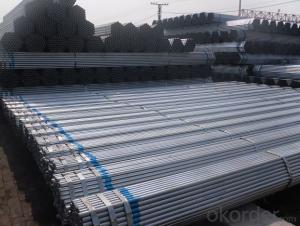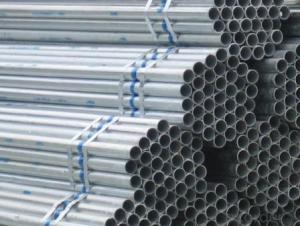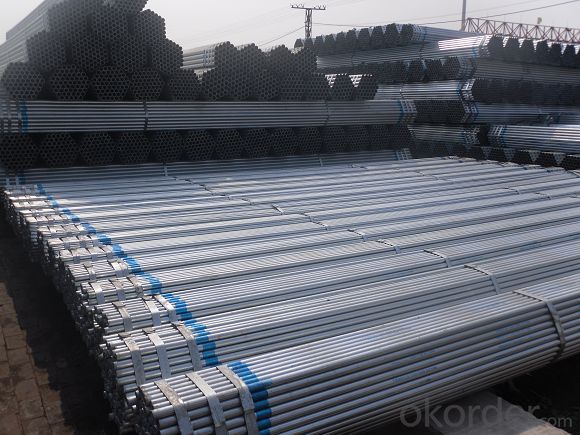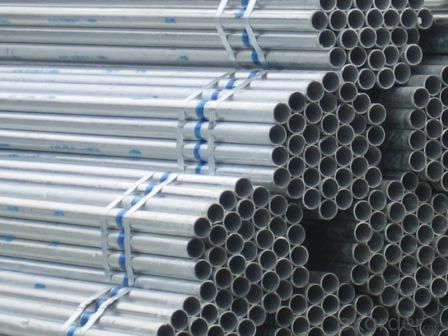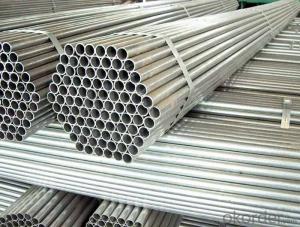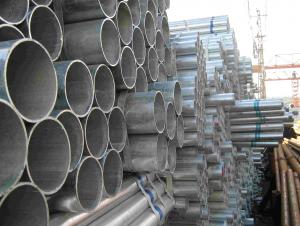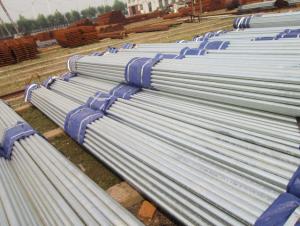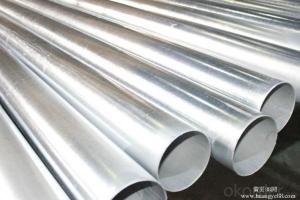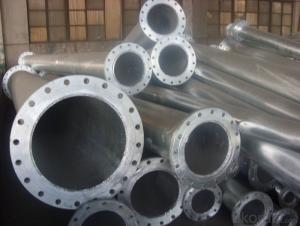Hot Dipped Galvanized Steel Pipe GB3091
- Loading Port:
- Tianjin
- Payment Terms:
- TT OR LC
- Min Order Qty:
- 25 m.t.
- Supply Capability:
- 7000 m.t./month
OKorder Service Pledge
OKorder Financial Service
You Might Also Like
1、Structure of Hot Dipped Galvanized Steel Pipe GB3091 :
The surface of Hot Dipped Galvanized Steel Pipe GB3091 can increase the corrosion resistance of the steel tube, prolong service life. Galvanized pipe is widely used, in addition to water, gas, oil and other general low pressure fluid pipelines. It is also used in the petroleum industry, especially for offshore oil field of oil well pipe and oil pipe, chemical, coking equipment of oil heater, condensation cooler, coal run oil exchanger tube, and trestle pile, the mine tunnel support frame tube.
2、Main Features of Hot Dipped Galvanized Steel Pipe GB3091 :
• High manufacturing accuracy
• High strength
• Good visual effect
• Reasonable price
• Small inertia resistance
• Strong heat dissipation ability
3、Hot Dipped Galvanized Steel Pipe GB3091 Specification:
Standard | GB, DIN, ASTM ASTM A106-2006, ASTM A53-2007 |
Grade | 10#-45#, 16Mn 10#, 20#, 45#, 16Mn |
Thickness | 1 - 33 mm |
Section Shape | Round |
Outer Diameter | 21 - 610mm |
Place of Origin | Tianjin, China (Mainland) |
Secondary Or Not | Non-secondary |
Application | Hydraulic Pipe |
Technique | Cold Drawn |
Certification | API |
Surface Treatment | factory state or painted black |
Special Pipe | API Pipe |
Alloy Or Not | Non-alloy |
Length | 5-12M |
Outer Diameter | 21.3-610mm |
Grade | 20#, 45#, Q345, API J55, API K55, API L80, API N80, API P110, A53B |
Standard | ASME, ASTM |
1) Material:20#(ASTM A 106/A53 GRB.API5LGRB,GB),45#,16Mn,10#.
2) Specification range:OD:21.3-610mm,WT:6-70mm,length:6-12m or according to the requirement of clients.
3) Excutive standards:GB,ASME API5L.ASTM A 106/A53,Despite of the above standards,we can also supply seamless steel pipe with standard of DIN,JIS,and so on,and also develop new products according to the requirements of our clients!
4) Surface:black lacquered,varnish coating or galvanized.
5) Ends:Beveled or square cut,plastic capped,painted.
6) Packing:bundles wrapped with strong steel strip,seaworthy packing.
4、Packaging & Delivery
Packaging Details: | seaworthy package,bundles wrapped with strong steel strip |
Delivery Detail: | 15-30days after received 30%TT |
5、FAQ of Hot Dipped Galvanized Steel Pipe GB3091 :
①How is the quality of your products?
Our products are manufactured strictly according to national and internaional standard, and we take a test
on every pipe before delivered out. If you want see our quality certifications and all kinds of testing report, please just ask us for it.
Guaranteed: If products’ quality don’t accord to discription as we give or the promise before you place order, we promise 100% refund.
②How about price?
Yes, we are factory and be able to give you lowest price below market one, and we have a policy that “ for saving time and absolutely honest business attitude, we quote as lowest as possible for any customer, and discount can be given according to quantity”,if you like bargain and factory price is not low enough as you think, just don’t waste your time.Please trust the quotation we would give you, it is professional one.
③Why should you chose us?
Chose happens because of quality, then price, We can give you both.Additionally, we can also offer professional products inquiry, products knowledge train(for agents), smooth goods delivery, exellent customer solution proposals.Our service formula: good quality+good price+good service=customer’s trust
SGS test is available, customer inspection before shipping is welcome, third party inspection is no problem.
6、 Hot Dipped Galvanized Steel Pipe GB3091 : Images:
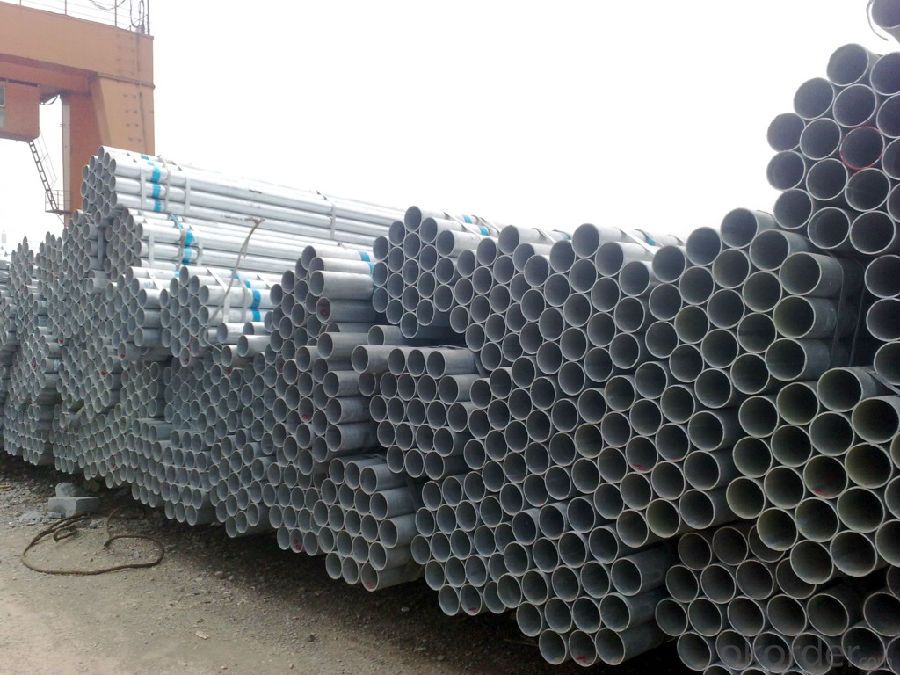
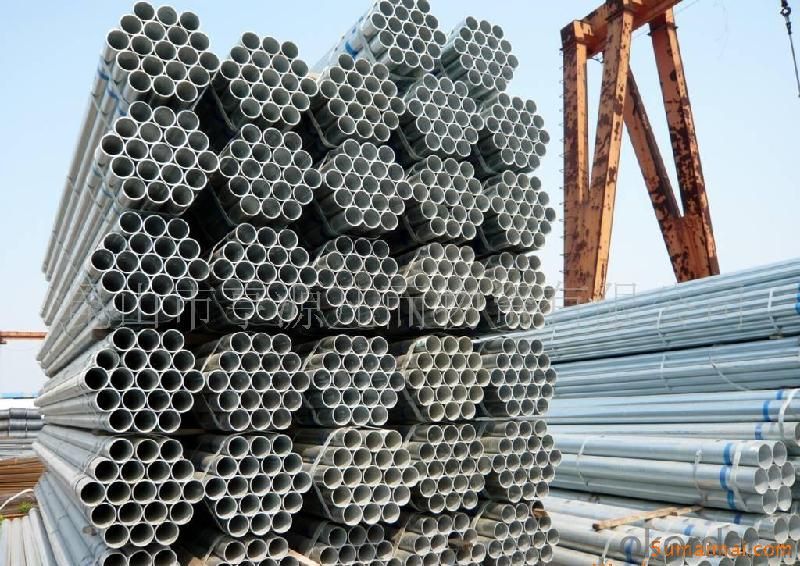
- Q: Can steel pipes be used for geothermal heating systems?
- Yes, steel pipes can be used for geothermal heating systems. Steel is a commonly used material in geothermal installations due to its durability, corrosion resistance, and ability to withstand high temperatures. It provides a reliable and long-lasting solution for transferring heat in geothermal heating systems.
- Q: What is the difference between steel pipes and PVC-O pipes?
- Steel pipes and PVC-O pipes differ in their material composition, strength, durability, and installation process. Steel pipes are made of steel, which makes them strong and suitable for high-pressure applications. However, they are prone to corrosion and require additional coating for protection. On the other hand, PVC-O pipes are made of a specially formulated, high-strength PVC material, which provides excellent resistance to corrosion, chemicals, and abrasion. PVC-O pipes are also lighter, easier to handle, and have a longer lifespan compared to steel pipes. Additionally, PVC-O pipes are installed using a jointing system, eliminating the need for welding or threading like steel pipes.
- Q: How do you solder purple copper plate and steel tube?
- The copper plate and the steel tube are brazed by brazing or argon arc welding.
- Q: How to perform nondestructive inspection of steel tubes
- Including fluorescence, coloring two kinds. Because of its simple equipment and convenient operation, it is an effective method to check the surface defect of magnetic particle inspection. It is mainly used for surface defect inspection of non-magnetic materials.
- Q: What are the different manufacturing standards for steel pipes?
- There are several different manufacturing standards for steel pipes, including American Society for Testing and Materials (ASTM), International Organization for Standardization (ISO), and American Petroleum Institute (API). These standards outline the requirements for various aspects of steel pipe manufacturing such as dimensions, material composition, mechanical properties, and testing procedures. Compliance with these standards ensures that steel pipes meet the necessary quality and performance requirements for their intended applications.
- Q: Can steel pipes be coated for aesthetic purposes?
- Indeed, steel pipes have the potential to be coated solely for aesthetic reasons. By applying coatings to steel pipes, not only can one achieve an attractive appearance, but also safeguard them against corrosion and other environmental influences. Numerous coating choices are at one's disposal when it comes to steel pipes, including powder coating, epoxy coating, and vinyl coating, among others. These coatings can be employed in various colors and textures to enrich the pipes' visual appeal and harmonize with their surroundings. Whether utilized in industrial settings, architectural endeavors, or for decorative purposes, the act of coating steel pipes has the power to metamorphose them into visually captivating components, all while preserving their structural integrity.
- Q: What is the maximum allowable pressure for steel pipes?
- The maximum allowable pressure for steel pipes depends on various factors such as the type of steel used, the diameter and thickness of the pipe, and the specific application or industry requirements. The American Society of Mechanical Engineers (ASME) provides guidelines and standards for pressure vessel and piping design, including the determination of maximum allowable pressure. ASME B31.1 and B31.3 are widely used codes for power piping and process piping respectively. These codes specify the design criteria for various materials, including steel, and provide formulas and charts to calculate the maximum allowable pressure for different pipe sizes and wall thicknesses. The maximum allowable pressure is typically determined based on the pipe's ability to withstand internal pressure without causing any permanent deformation or failure. It is important to note that the maximum allowable pressure for steel pipes may also be influenced by other factors such as temperature, corrosion, and the presence of any external loads or stresses. Therefore, it is essential to consult the relevant codes, standards, and engineering calculations specific to the application to ensure the safe and reliable operation of steel pipes under the given conditions.
- Q: How are steel pipes classified according to their use?
- Steel pipes are classified according to their use based on factors such as their diameter, wall thickness, and the intended application.
- Q: How do you calculate the pipe pressure loss coefficient for steel pipes?
- To determine the pressure loss coefficient for steel pipes, one can utilize the widely accepted Darcy-Weisbach equation. This equation calculates the pressure loss in pipes caused by friction. It can be represented as follows: ΔP = f × (L/D) × (V^2/2g) In this equation: - ΔP represents the pressure loss in units of pressure, such as psi or Pa. - f denotes the Darcy friction factor, a dimensionless value. - L signifies the pipe length in units of length, such as feet or meters. - D represents the pipe diameter in units of length, such as feet or meters. - V indicates the fluid velocity flowing through the pipe in units of velocity, such as ft/s or m/s. - g represents the acceleration due to gravity in units of acceleration, such as ft/s² or m/s². The Darcy friction factor (f) is a dimensionless parameter that quantifies the amount of frictional resistance in the pipe. For steel pipes, this factor can be determined using the Moody diagram. The Moody diagram presents a graphical relationship between the Reynolds number (Re) and the friction factor (f) for various pipe roughness values. To calculate the pressure loss coefficient, one should find the friction factor (f) value based on the Reynolds number (Re) and the relative roughness of the steel pipe (ε/D). The Reynolds number is calculated as follows: Re = (ρ × V × D) / μ In this equation: - ρ represents the fluid density in units of mass per unit volume, such as lb/ft³ or kg/m³. - V denotes the fluid velocity in units of velocity, such as ft/s or m/s. - D signifies the pipe diameter in units of length, such as feet or meters. - μ represents the dynamic viscosity of the fluid in units of force per unit area per unit time, such as lb/ft·s or kg/m·s. Once the Reynolds number (Re) and the relative roughness (ε/D) are determined, one can refer to the Moody diagram to find the corresponding friction factor (f). The pressure loss coefficient (K) can then be calculated using the following formula: K = f × (L/D) In this equation: - L represents the pipe length in units of length, such as feet or meters. - D denotes the pipe diameter in units of length, such as feet or meters. By utilizing the Darcy-Weisbach equation and the Moody diagram, one can accurately calculate the pressure loss coefficient for steel pipes. This calculation is crucial for the design and analysis of fluid flow systems.
- Q: What are the safety measures to be followed while working with steel pipes?
- When working with steel pipes, it is important to follow several safety measures to ensure the well-being of workers and prevent accidents. Some of the key safety measures include: 1. Personal Protective Equipment (PPE): Workers should always wear appropriate PPE, including safety glasses, steel-toed boots, gloves, and hard hats to protect themselves from potential hazards. 2. Proper Lifting Techniques: Steel pipes can be heavy, so workers should use proper lifting techniques, such as bending their knees and using their leg muscles, to prevent strain or injury to their back. 3. Secure Storage and Handling: Steel pipes should be stored in a secure and organized manner to prevent them from falling or causing any hazards. Workers should also use appropriate lifting equipment, such as cranes or forklifts, to handle heavy steel pipes safely. 4. Inspect Pipes for Defects: Before working with steel pipes, they should be inspected for any defects, such as cracks or corrosion, that could compromise their structural integrity. Damaged pipes should be replaced to avoid potential accidents. 5. Proper Welding and Cutting Techniques: When welding or cutting steel pipes, workers should follow proper techniques and use appropriate safety equipment, such as welding masks and fire-resistant clothing, to prevent burns, fires, or explosions. 6. Fall Protection: When working at heights or on elevated platforms, workers should use fall protection equipment, such as harnesses and safety nets, to prevent falls and injuries. 7. Adequate Ventilation: In enclosed spaces where welding or cutting activities take place, proper ventilation should be ensured to prevent the accumulation of harmful fumes or gases. 8. Fire Prevention: Steel pipes can be flammable, especially when cutting or welding. Therefore, it is crucial to have fire prevention measures in place, such as fire extinguishers and fire blankets, and to follow proper fire safety protocols. By adhering to these safety measures, workers can minimize the risks associated with working with steel pipes and create a safer working environment.
Send your message to us
Hot Dipped Galvanized Steel Pipe GB3091
- Loading Port:
- Tianjin
- Payment Terms:
- TT OR LC
- Min Order Qty:
- 25 m.t.
- Supply Capability:
- 7000 m.t./month
OKorder Service Pledge
OKorder Financial Service
Similar products
Hot products
Hot Searches
Related keywords
